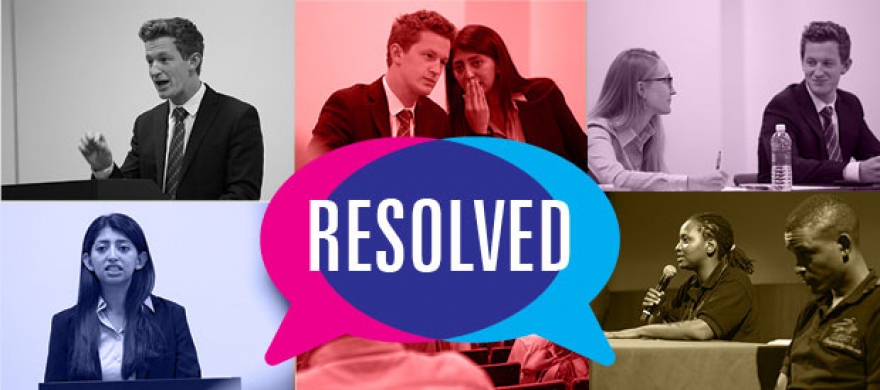What do you know about the Pepperdine debate team? That’s a rhetorical question ... in more than one sense of the word. The history of forensics at Pepperdine dates back to the beginning of George Pepperdine College (GPC) at the University’s original Los Angeles campus. Established during the college’s first academic year, the debate team gained momentum with Batsell Barrett Baxter, son of first president Batsell Baxter, who joined the fledging school’s faculty as an instructor in speech and coach of debate in 1938.
In its earliest years through World War II, the debate squad collected hundreds of awards in national competitions and even established the Founder's Day oratorical contest, which attracted contestants from major colleges across the American West for several years. In 1942 Pi Kappa Delta, the national honorary society in speech communication, formally granted GPC a chapter, becoming the first national honorary organization on the campus.
By the early 1990s, debate teams were primarily led by visiting faculty, with competition often focused on a hyper- specific, research-intensive format called policy debate,” says Sarah Stone Watt, who joined the Seaver College faculty as director of forensics and associate professor of communication in 2007 with the charge to expand the debate team. In an effort to better serve students and support the University’s mission, Stone Watt began exploring regular use of other forensic styles beyond policy debate and last year introduced the team to the international standard of British Parliamentary debate.
As an international format of debate, British Parliamentary aligns perfectly with Pepperdine’s global focus,” shares Stone Watt. “It means that not only can we send debaters to other countries to engage in this format, but we can also host and recruit international students already familiar with the type of debate.”
For example, in 2014 Pepperdine hosted a team from iDebate Rwanda, an NGO with a mission to change the lives of high school and middle school Rwandans and East Africans with tools of debate. The team embarked on multi-city U.S. tour called "Voices from a Post-Genocide Generation," commemorating the 20th anniversary of the Rwandan genocide. After a successful visit last year, including a full-house debate on campus, the team began their U.S. tour this year in Malibu, building a partnership with Pepperdine debate students for five days.
Every moment spent with the team was eye-opening,” says Marin Loken, a senior liberal arts major. “They brought with them a passion to educate, a hunger to learn, and an eagerness to meet new people and explore Malibu.”
Expecting to grow the team in future years, Stone Watt is thinking big and small, emphasizing both a global presence and a renewed commitment to the local community. After having hosted iDebate Rwanda again this fall, as well as two of the top debaters in Great Britain, in October the team made its first debate appearance at Politicon, an “unconventional political convention” held in Downtown Los Angeles. This spring, the team will forge into the 2016 election cycle—facilitating rigorous debates on key ballot issues while bringing together political clubs on campus and encouraging Pepperdine students to register to vote.
Once that’s over, I want to debate issues of concern to Pepperdine and the local community and really be as active here as we are elsewhere,” Stone Watt explains.
Policy debater Lilit Elechyan, a member recruited to the team from high school, agrees. “I hope the debate team evolves to include more events and have a bigger campus presence,” says the senior political science major. “I would love to see more people come to experience this profoundly meaningful activity." That isn't to say the team doesn’t still have competition on its mind, eyeing future appearances at both the National Debate Tournament and the Pan American Universities Debating Championship. In recent years, students have also received invitations to the James Madison University Madison Cup and the Lafayette Debates, a competition cohosted by The George Washington University and the French Embassy.
Participating in the Lafayette Debates last spring in Washington, D.C., is at the top of my list of experiences as part of this squad,” says Luke Collins, a senior economics major. “With this study tour, Pepperdine debate students had the incredible opportunity to further develop Franco-American relations while participating in a debate on climate change ahead of the 2015 Paris Climate Conference this fall.”
In the meantime, Stone Watt is already focused on recruiting the next generation of Pepperdine’s most analytical minds, highlighting the debate team’s distinctive benefits. “Debate makes you a better all- around student, employee, and citizen with students on the team gaining a powerful shortcut into research, argumentation, and advocacy skills,” Stone Watt explains.
Debate is an art; it takes time and dedication,” says Elechyan. “And as I continuously discover the countless benefits of debate, I also think about the legacy I’ll leave behind. I want to be known as a team that always exemplifies Pepperdine’s mission—working hard to serve, lead, and do all things with purpose.”
